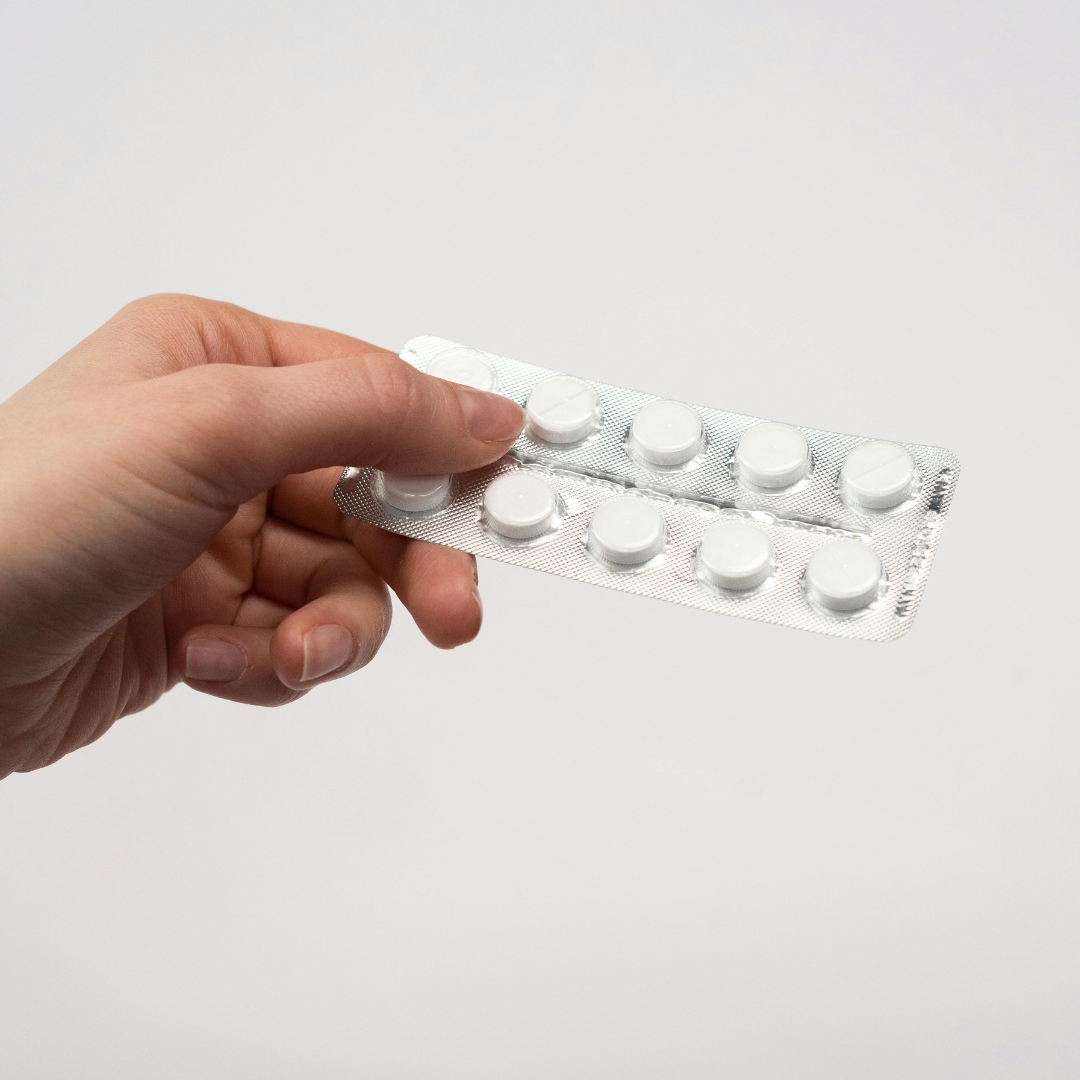Probiotics and Antibiotics: Evidence-Based Insights

Antibiotics are powerful tools in fighting bacterial infections, but they can also disrupt the delicate balance of the gut microbiome, which is home to trillions of beneficial bacteria that support digestion, immunity, and overall well-being. When this balance is disturbed, issues like antibiotic-associated diarrhoea and increased vulnerability to harmful bacteria may follow. So, can probiotics help protect the gut during and after antibiotic use? And what are the best probiotics to take with antibiotics? This article explores how antibiotics affect the microbiome, how probiotics work to restore gut health, and which probiotic strains are best supported by research for maintaining balance and preventing digestive side effects.
Antibiotics and the gut
Antibiotics are medicines that destroy or inhibit bacterial growth by targeting essential processes like cell wall formation and protein synthesis1. While highly effective against infections, antibiotics cannot distinguish between harmful and helpful bacteria, so their use often reduces the number and diversity of beneficial microbial species in the gut, sometimes resulting in long-term changes to its balance2.
Antibiotics can reduce the number and diversity of beneficial bacteria in the gut3. This disruption, known as dysbiosis, decreases microbiome resilience and may allow harmful microorganisms to flourish, with long-term effects on digestion, immunity, and metabolism4. Recovery of microbial diversity after antibiotic use can take weeks or even months and may not always fully restore the original community structure.
This disturbance can lead to side effects such as antibiotic-associated diarrhoea, increased susceptibility to Clostridioides difficile infection, and overall gut dysbiosis, which impairs digestion and immune function5,6.
Probiotics and antibiotics: how do they interact?
Probiotics are live microorganisms that, when administered in sufficient amounts, confer health benefits to the host, mainly by supporting gut and immune health7. After an antibiotic course, probiotics may help restore balance to the intestinal microbiome by colonising the gut and competing with pathogens for space and nutrients, preventing overgrowth of harmful bacteria8.
Probiotics support digestive health and overall well-being through several mechanisms:
- Restoring microbiome balance: After disruptions like antibiotic use, probiotics help re-establish healthy levels of “good” bacteria, supporting the restoration of the natural intestinal flora9.
- Competitive exclusion of pathogens: Probiotics compete with pathogenic bacteria for nutrients and adhesion sites on mucosal surfaces, making it harder for pathogens to survive and multiply10.
- Strengthening the gut barrier: Probiotics improve gut health by increasing the production of mucins and tight junction proteins, which reinforce the epithelial barrier and prevent pathogens or toxins from entering the bloodstream11.
- Modulating the immune response: Probiotics actively interact with immune cells, such as dendritic cells and lymphocytes, to modulate both innate and adaptive immunity12. They also promote the production of anti-inflammatory cytokines and support regulatory T cell development, helping maintain immune tolerance and balance.
The best probiotics to take with antibiotics - what the research shows
- Lactobacillus rhamnosus GG: Multiple randomised controlled trials (RCTs) and meta-analyses show that L. rhamnosus GG significantly reduced the incidence of antibiotic-associated diarrhoea (AAD) in both adults and children, with rates dropping from 28% to 11% in hospitalised patients13,14. Supplementation during antibiotic therapy has also been associated with a markedly lower risk of Clostridioides difficile infection (CDI), with one study reporting zero cases in the probiotic group compared with 11% in controls14. Furthermore, supplementation during antibiotic therapy improved dyspepsia after eradication of Helicobacter pylori infection alongside other gastrointestinal symptoms, improving patient comfort and recovery15.
- Saccharomyces boulardii: Robust RCT evidence supports efficacy in reducing AAD and preventing recurrent CDI when used with or following antibiotic therapy, especially alongside high-dose vancomycin; it was well tolerated in trials16,17.
- Bifidobacterium lactis: Supplementation with B. lactis (often in combination with other probiotics) during antibiotic therapy has been shown to prevent or improve gastrointestinal symptoms, including diarrhoea, flatulence, abdominal pain, and abnormal stool consistency in both adults and children18–20. Co-administration with antibiotics helps maintain a more stable gut microbiota composition and faecal SCFA levels, supporting faster recovery of beneficial bacteria and metabolic function after antibiotic use21.
- Bacillus coagulans: A high-dose probiotic mix containing B. coagulans significantly reduced the incidence of AAD in adults receiving broad-spectrum antibiotics, with an absolute risk reduction of 16% compared with placebo22.
- Lactobacillus acidophilus: A randomised, placebo-controlled study found that L. acidophilus supplementation was associated with a trend toward reduced AAD incidence and significantly shortened diarrhoea duration, especially in younger adults23.
- Streptococcus thermophilus: Especially in combination with other probiotics, S. thermophilus has shown benefits during or after antibiotic therapy, including reducing AAD in children and lowering the risk and severity of CDI in adults24,25.
- Lactobacillus reuteri: Co-administration of L. reuteri with antibiotics has been associated with significantly reduced AAD and complete prevention of CDI in hospitalised adults compared with antibiotics alone14. In animal models, it also helps restore the balance of gut microbiota disrupted by antibiotics, promotes the growth of beneficial bacteria, and reduces the abundance of pathogens such as Escherichia coli26.
Clinical takeaways for healthcare professionals
Robust evidence supports the use of strain-specific probiotics to reduce risks such as AAD, including CDI, in certain patient groups. Selecting high-quality products is key to maximising safety and efficacy.
Advise patients to take probiotics during and after antibiotic therapy, ideally separating the probiotic dose from antibiotics by at least 2–4 hours to help ensure the survival of beneficial microbes. Set realistic expectations; most patients experience mild benefits, with some reporting a significant reduction in diarrhoea or gut disturbance, while others may see limited improvement. Encourage symptom tracking and inform patients about possible mild transient effects (gas, bloating).
If the patient develops severe diarrhoea, dehydration, or other recurrent symptoms, they should be referred to a specialist. In most cases, evidence-based probiotic supplementation appears safe and well tolerated, and can be a valuable adjunct to antibiotic regimens to support gut health and reduce adverse outcomes.
References
- Patel P, Wermuth HR, Calhoun C, Hall GA. Antibiotics. In: StatPearls [Internet]. Treasure Island (FL): StatPearls Publishing; 2025 [cited 2025 Oct 3]. Available from: http://www.ncbi.nlm.nih.gov/books/NBK535443/
- Patangia DV, Anthony Ryan C, Dempsey E, Paul Ross R, Stanton C. Impact of antibiotics on the human microbiome and consequences for host health. Microbiologyopen. 2022 Jan 13;11(1):e1260.
- Patangia DV, Anthony Ryan C, Dempsey E, Paul Ross R, Stanton C. Impact of antibiotics on the human microbiome and consequences for host health. Microbiologyopen. 2022 Jan 13;11(1):e1260.
- Cusumano G, Flores GA, Venanzoni R, Angelini P. The Impact of Antibiotic Therapy on Intestinal Microbiota: Dysbiosis, Antibiotic Resistance, and Restoration Strategies. Antibiotics (Basel). 2025 Apr 3;14(4):371.
- Zhang S, Chen DC. Facing a new challenge: the adverse effects of antibiotics on gut microbiota and host immunity. Chin Med J (Engl). 2019 May 20;132(10):1135–8.
- Ramirez J, Guarner F, Bustos Fernandez L, Maruy A, Sdepanian VL, Cohen H. Antibiotics as Major Disruptors of Gut Microbiota. Front Cell Infect Microbiol [Internet]. 2020 Nov 24 [cited 2025 Oct 3];10. Available from: https://www.frontiersin.org/journals/cellular-and-infection-microbiology/articles/10.3389/fcimb.2020.572912/full
- Office of Dietary Supplements - Probiotics [Internet]. [cited 2025 Oct 3]. Available from: https://ods.od.nih.gov/factsheets/Probiotics-HealthProfessional/
- Suvvari TK, Vallurupalli V, Koneru KS, Ingawale S, Yegurla RR. The Lasting Imprint of Antibiotics on Gut Microbiota: Exploring Long-Term Consequences and Therapeutic Interventions. Cureus. 17(5):e84114.
- Shoaib A, Dachang W, Xin Y. Determining the role of a probiotic in the restoration of intestinal microbial balance by molecular and cultural techniques. Genet Mol Res. 2015 Feb 20;14(1):1526–37.
- Bradford G, Asgari B, Smit B, Hatje E, Kuballa A, Katouli M. The Efficacy of Selected Probiotic Strains and Their Combination to Inhibit the Interaction of Adherent-Invasive Escherichia coli (AIEC) with a Co-Culture of Caco-2:HT29-MTX Cells. Microorganisms. 2024 Feb 29;12(3):502.
- Hemarajata P, Versalovic J. Effects of probiotics on gut microbiota: mechanisms of intestinal immunomodulation and neuromodulation. Therap Adv Gastroenterol. 2013 Jan;6(1):39–51.
- Yan F, Polk DB. Probiotics and immune health. Curr Opin Gastroenterol. 2011 Oct;27(6):496–501.
- Sybesma W, Westerik N, Dalukdeniya C, Tumuhimbise J, Gregorowitsch E, Garssen J, et al. Effects of probiotic yogurt on relative respiratory tract infections, urine, saliva biomarkers, and fecal bacterial load in Ugandan children: a randomized controlled trial. Sci Rep. 2025 Mar 19;15:9478.
- Saviano A, Petruzziello C, Cancro C, Macerola N, Petti A, Nuzzo E, et al. The Efficacy of a Mix of Probiotics (Limosilactobacillus reuteri LMG P-27481 and Lacticaseibacillus rhamnosus GG ATCC 53103) in Preventing Antibiotic-Associated Diarrhea and Clostridium difficile Infection in Hospitalized Patients: Single-Center, Open-Label, Randomized Trial. Microorganisms. 2024 Jan 18;12(1):198.
- Marinelli P, Scalese G, Covelli A, Ruffa A, Bedetti G, Bruno G, et al. Lactobacillus rhamnosus GG supplementation on eradication rate and dyspepsia in Helicobacter pylori infection treated with three-in-one bismuth quadruple therapy. Front Microbiol. 2022 Dec 5;13:932331.
- Surawicz CM, McFarland LV, Greenberg RN, Rubin M, Fekety R, Mulligan ME, et al. The search for a better treatment for recurrent Clostridium difficile disease: use of high-dose vancomycin combined with Saccharomyces boulardii. Clin Infect Dis. 2000 Oct;31(4):1012–7.
- Duman DG, Bor S, Ozütemiz O, Sahin T, Oğuz D, Iştan F, et al. Efficacy and safety of Saccharomyces boulardii in prevention of antibiotic-associated diarrhoea due to Helicobacter pylori eradication. Eur J Gastroenterol Hepatol. 2005 Dec;17(12):1357–61.
- Trallero OG, Serrano LH, Inglés MB, Vallés DR, Rodríguez AM. Effect of the administration of a probiotic with a combination of Lactobacillus and Bifidobacterium strains on antibiotic-associated diarrhea. Rev Esp Quimioter. 2019;32(3):268–72.
- Liu Q, Liu L, Zhou J, Duan Y, Shi C, Zeng Y. Saccharomyces boulardii and Bifidobacterium co-treatment for antibiotic associated diarrhea in pediatrics: a multicenter efficacy and safety study. Front Cell Infect Microbiol. 2025 Jun 24;15:1575605.
- Wu J, Gan T, Zhang Y, Xia G, Deng S, Lv X, et al. The prophylactic effects of BIFICO on the antibiotic-induced gut dysbiosis and gut microbiota. Gut Pathog. 2020 Sep 9;12:41.
- Merenstein D, Fraser CM, Roberts RF, Liu T, Grant-Beurmann S, Tan TP, et al. Bifidobacterium animalis subsp. lactis BB-12 Protects against Antibiotic-Induced Functional and Compositional Changes in Human Fecal Microbiome. Nutrients. 2021 Aug 17;13(8):2814.
- Hodzhev V, Dzhambazov K, Sapundziev N, Encheva M, Todorov S, Youroukova V, et al. High-dose Probiotic Mix of Lactobacillus spp., Bifidobacterium spp., Bacillus coagulans, and Saccharomyces boulardii to Prevent Antibiotic-associated Diarrhea in Adults: A Multicenter, Randomized, Double-blind, Placebo-controlled Trial (SPAADA). Open Forum Infect Dis. 2024 Oct 21;11(11):ofae615.
- Zhu J, Sun Y, Dong Y, Zhao Y, Gai Z, Fang S. Efficacy and Safety of Lactobacillus acidophilus LA85 in Preventing Antibiotic‐Associated Diarrhea: A Randomized, Placebo‐Controlled Study. Food Sci Nutr. 2025 Jun 20;13(6):e70490.
- Corrêa NBO, Péret Filho LA, Penna FJ, Lima FMLS, Nicoli JR. A randomized formula controlled trial of Bifidobacterium lactis and Streptococcus thermophilus for prevention of antibiotic-associated diarrhea in infants. J Clin Gastroenterol. 2005;39(5):385–9.
- Hickson M, D’Souza AL, Muthu N, Rogers TR, Want S, Rajkumar C, et al. Use of probiotic Lactobacillus preparation to prevent diarrhoea associated with antibiotics: randomised double blind placebo controlled trial. BMJ. 2007 Jul 14;335(7610):80.
- Yang J, Wang C, Liu L, Zhang M. Lactobacillus reuteri KT260178 Supplementation Reduced Morbidity of Piglets Through Its Targeted Colonization, Improvement of Cecal Microbiota Profile, and Immune Functions. Probiotics Antimicrob Proteins. 2020 Mar;12(1):194–203.



